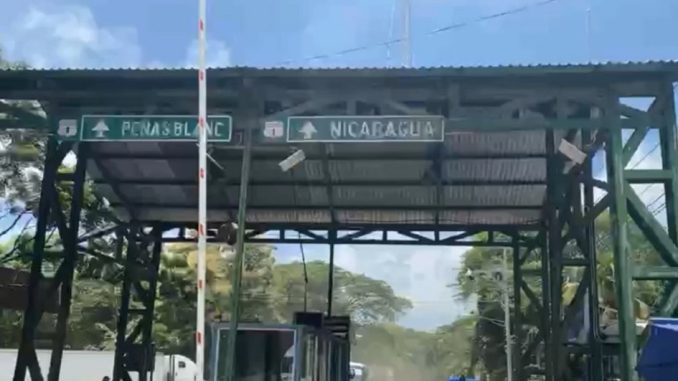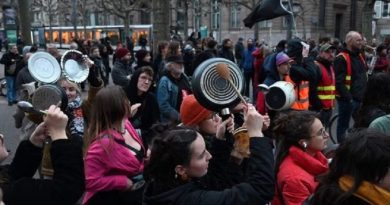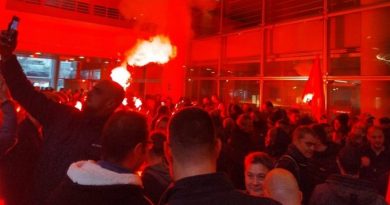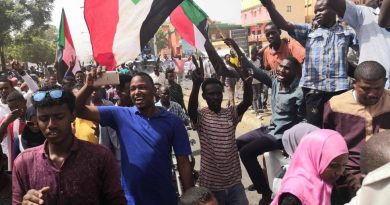Nicaragua: Historical caravan and internationalist Commission challenged the Ortega-Murillo dictatorship
Yesterday, the International Commission for the Freedom of Political Prisoners in Nicaragua, driven by the International Socialist League together with the PRT of Costa Rica, Anti-Capitalist Alternative of Nicaragua and in unity of action with numerous organizations of relatives, political and social throughout the continent, toured the 300 kilometers that separate San José in Costa Rica from the Peñas Blancas border post in Nicaragua. The regional and international impact of the news became the most important political event in Central America in recent days and managed to install in public opinion the demand for the freedom of more than 180 detained for fighting against the capitalist dictatorship that governs Nicaragua.
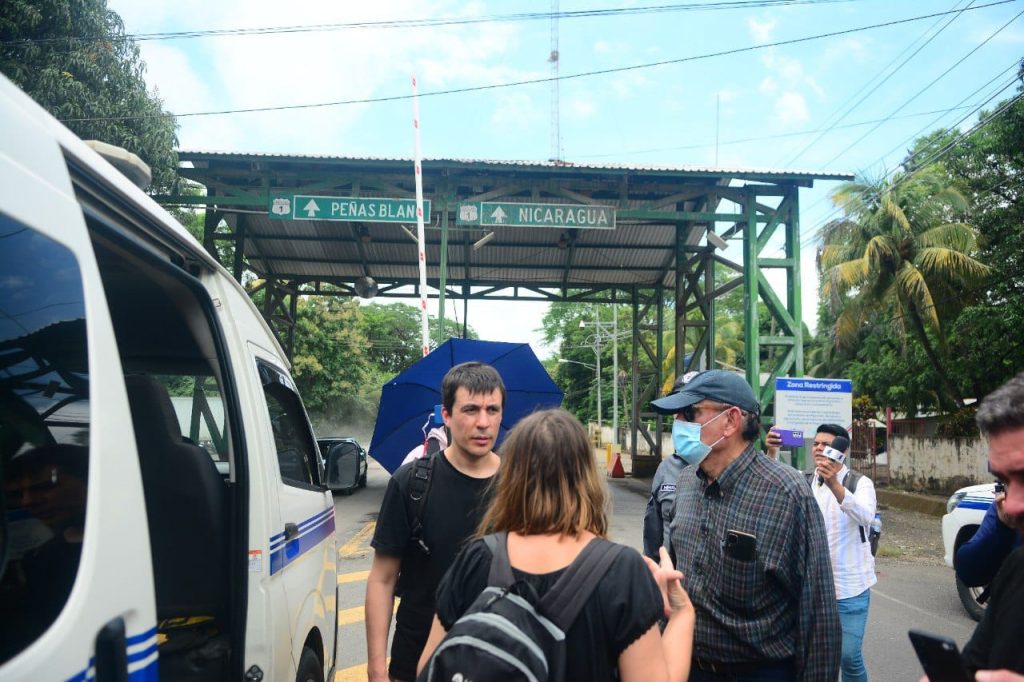
The Ortega-Murillo dictatorship accused the coup and reacted by militarizing the border to prevent the International Commission from entering and visiting political prisoners., thus corroborating all the complaints made by the relatives and at the same time showing concern for the internationalist initiative promoted by the LIS. To learn more about the activity of the historic Caravan that reached the Nicaraguan border, we interviewed our colleague Mariano Rosa, leader of the MST in the FITU of Argentina and Coordinator of the Commission.
Mariano Rosa from Costa Rica
On Friday from very early we were concentrating in San José, Costa Rican capital, dozens of buses, buses, private cars and other means of transportation provided by family organizations, social and political organizations that drive the initiative: the PRT and other organizations in Costa Rica, the parliamentarians of the FITU of Argentina, among them our fellow MST Luciana Echevarria, members of the MES PSOL of Brazil and other representatives of organizations in Panama, Mexico and the Dominican Republic.
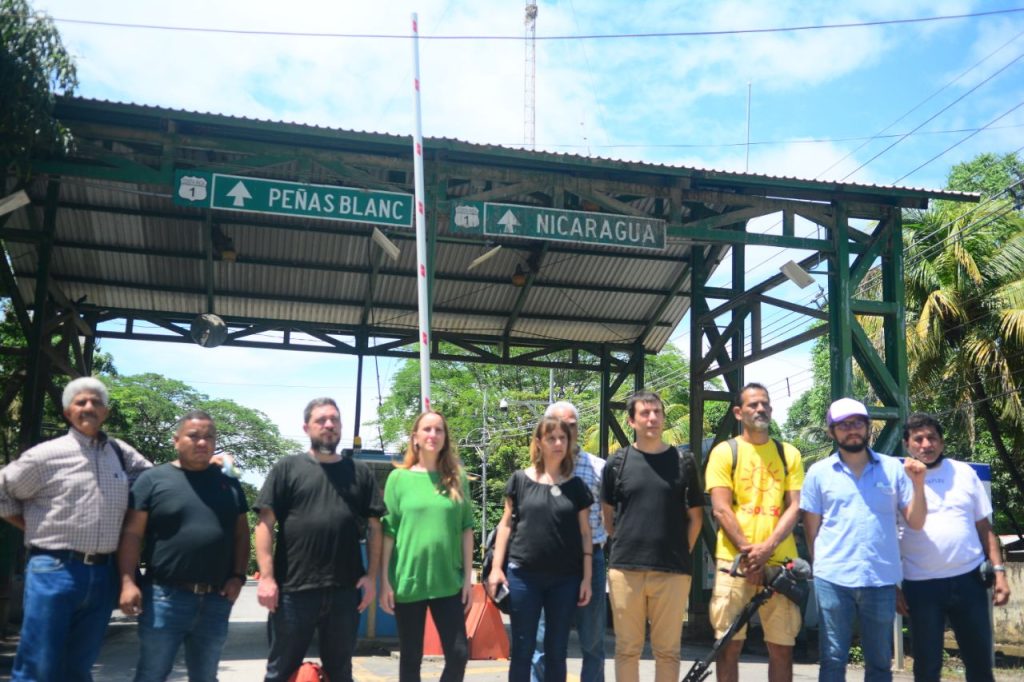
In the previous days and thanks to the militant task of disseminating, Very important adherences and wills were added at the time that a great sympathy was reflected within Nicaragua itself, beyond the regime blockade.
Every day the organizational team, logistics manager, should incorporate more and more means of transportation and averaging the week, we received very important news in the Commission; the adhesion of the peasant movement, with a very representative delegation from their camp in Upala, in the north of Costa Rica on the way to Nicaragua, headed by Doña Francisca “Chica” Ramírez, one of the most important leaders of the struggles of the “anti-canaleros” peasants and for the freedom of imprisoned peasants located in the Chontales penitentiary unit in Nicaragua.
To this we must add that a contingent of 30 journalists accompanied the entire journey of the caravan for dignity giving publicity to this important initiative.
shows of sympathya, solidarity and growing social support for the initiative of the Commission and the LIS
During the entire journey of the Caravan, hundreds of people located on the sides of the road greeted and expressed their solidarity waving blue and white flags, emblems of the anti-dictatorial struggle in Nicaragua. In fact, it is forbidden in that country to fly the national flag in the streets and is punishable by imprisonment, Thus, has become an emblem of anti-dictatorship struggle and resistance, beyond the fact that sectors of big business and the church want to appropriate its use.
Likewise, there was throughout the day and fundamentally after knowing the final result of the action and the response of the Ortega government, very important local and regional demonstrations of solidarity, such as the public statement and pronouncement against the Ortega-Murillo policy of the most important living writer in Nicaragua, the renowned and exiled Gioconda Belli.
Arrival at the border and the role of the Costa Rican government
The caravan had a station prior to the border in the town of La Cruz, where a confluence rally with the peasant movement was held, in the same I had to speak, in my capacity as coordinator of the Commission for the International Socialist League, together with the leader Francisca “Chica” Ramirez. After this activity, we left guarded by the Costa Rican police to the border post located 300 meters of Nicaraguan territory. Once there and on the basis of having foreseen and agreed that the Costa Rican police would accompany the caravan to Nicaraguan territory, to insist on entering the immigration authorities of that country, However, at the border the panorama was completely different.. On the one hand, the determination of the Ortega-Murillo dictatorship to prevent the entry of the Commission with the threatening message of the colossal military deployment, calculating more than 300 effective, more snipers and paramilitaries, that in the face of the commission's determination to insist on fulfilling its mission of entering, ended up effectively closing the border with Costa Rica. Against this, The Costa Rican government, in virtual agreement with the Nicaraguan government, prevented the commission from approaching the Peñas Blancas border post, arguing that it could not guarantee the security of the contingent and to avoid “crisis or serious consequences in the diplomatic relationship between Costa Rica and Nicaragua”.
At this point we can only denounce the role of the government of President Chavez, in Costa Rica, who in several episodes showed that, beyond some isolated manifestation, has tried to cohabit and maintain relations with the dictatorship and under no circumstances condemn it. For example, given the need to designate a Central American official for a regional organization in trade relations with the European Union, Initially, he stated that he was accompanying a proposal from the Ortega-Murillo dictatorship for that appointment., to later go back as a result of the massive repudiation. It also blocked the possibility of entering, denying them visa, to young Nicaraguan students from the LIS exiled in Argentina and when the Commission arrived at the border, it acted as a de facto team with the dictatorship since it did nothing to facilitate the coordination for the effective entry of the Commission into Nicaragua. That is why at this point we want to be categorical, the government of Costa Rica works in tandem with that of Nicaragua and beyond its democratic facade it has done nothing more than show its total complicity with that.
Militarization and closure of the border: the dictatorship proves us right
There is no record of a military deployment, with snipers over 300 troops at the Peñas Blancas border post in the last four years. Nor that before the arrival of a Commission like the one that promoted the LIS, the border has been closed as in this case. It is clear that the impact of the Commission's action, the installation in the public agenda on the situation of the prisoners that managed to point out, the circulation of the news in Nicaragua itself through a thousand alternative channels to the official ones controlled by the presidential couple, made the determination of the dictatorship of, on the one hand, perform a show of strength and on the other, also express concern about the effect that the entry of the Commission with the characteristics of the one we promoted and built could have within the country.
Obviously, As a first conclusion, it is demonstrated that the dictatorship that on other occasions invoked that different missions of the so-called "International community", without the deployment or strength of what we had as the International Commission headed by the ISL, They were sent by the American Embassy, interfering and with coup outputs, in this case with the Commission made up of clearly leftist references, with a declaration of purposes with broad representation and international adherence that established a clear delimitation of any imperialist camp and any interference, worried in such a way that it forced them to make a scandalous and disproportionate decision.
The show of sympathy to the interior of Nicaragua, that came through a thousand messages, family members' complaints about what really happens in prisons and in the interior of the country, I fully confirm that what the Commission put up for debate is real: in Nicaragua there is a police state and a permanent action of vexation, torture and violation of human rights in Nicaraguan prisons, this is a proven fact.
On the other hand, This Commission is going to prepare, based on the testimonies of those released, relatives of the murdered and disappeared and other victims of the dictatorship and various exile organizations, a report for a final rapporteurship that in the coming weeks will be made known to the world so that everyone knows the reality of what is happening in a Nicaragua governed by a capitalist dictatorship that uses Stalinist methods of repression and persecution.
Finally, to know that this initiative that we are taking on this occasion is only the first step in a permanent movement for the life and freedom of political prisoners in Nicaragua that will surely prepare new actions with greater impact since we have the commitment that is an oath with relatives and organizations in exile, as part of the International Socialist League to carry to the end this fight that we are carrying out now.

